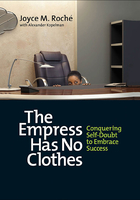
Preface
Right around the time I first began thinking about writing this book, I heard Cory Booker, the dynamic young mayor of Newark, New Jersey, speak about his vision of what young people need to succeed. I found the speech moving, especially when in summing up, Mayor Booker said: “You’ve got to learn to metabolize your blessings.” It seemed as if he was at once describing my own journey to embracing success and pointing the way for all of us who have faced the kind of self-doubt that has made us feel like impostors.
The inability to recognize and celebrate our own strengths and accomplishments is at the very heart of what is known as the impostor syndrome—that feeling of being a fraud and not deserving of our success. We look at the objective evidence of our success, and all we can see is a false facade that will inevitably come crashing down, unless we work tirelessly to maintain it.
“There were times I remember,” says Dr. Ella Edmondson Bell, Associate Professor of Business Administration at the Tuck School of Business at Dartmouth, “I felt like I was a con artist. I felt I was being something I’m not.”
Too many of us fritter away too much time, talent, and emotional energy on hiding who we really are because we are afraid we will not be accepted or acceptable. One of the most devastating aspects of the impostor syndrome is that by its very nature it isolates us from other people and forces us to keep our innermost feelings secret.
I lived with the secret feeling of not fitting in and the fear of being discovered as not being up to the task for much of my professional life. I know full well how heavy a burden that secret is, and I know what a wonderful relief it is to open up and to begin to question the voice that keeps repeating “you are not good enough” and “you don’t belong here.”
This book is an invitation to everyone who suffers from impostor feelings to realize that you are not alone and to begin working toward embracing your success. The purpose is not necessarily to answer the question of why you feel this way but to focus on the fact that you do not need to allow the feelings to define your life. As I learned through my own journey, the essential work of managing and ultimately conquering the impostor syndrome lies in learning how to metabolize external validation to turn it into the core strength of internal validation.
The root causes of the impostor syndrome are complex and manifold. And so are the situations that trigger them. (Your answers to the questions about impostor feelings at the beginning of the book may give you a glimpse of your own experience.) In the coming chapters, I will share stories of key milestones in my life when the fears of being discovered as a fake were particularly strong. Each chapter will focus on specific panic points, the times when my heart started to race and I was gripped with fear. Situations that I know will speak to some of your own experiences.
In each chapter, you will also hear the voices and stories of a group of some of the most amazing and successful people I know (both men and women), all of whom have dealt with the impostor syndrome, even though you never would have known it as an observer.
Throughout the book, I suggest strategies from my own experiences and those of others that you can use to begin to wrestle with your own sense of being an impostor. You cannot silence panic; you can only calm it. The best way to do that is to open up, at least to yourself, and to take an honest assessment of how you got to the place where you are and ask yourself whether you deserve to be there—in other words, to exercise the muscles of internal validation. The more you learn how to own your success, the more you will thrive on it.
If there is nothing else you take away from the book, I want you to know that comfort does come with time. My wish for you is that this book will help you achieve it quickly.